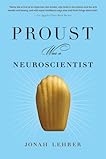 Proust Was a Neuroscientist by Jonah Lehrer
Proust Was a Neuroscientist by Jonah LehrerMy rating: 3 of 5 stars
I was drawn to Jonah Lehrer's book when I saw a light blue paperback with a madeleine cookie on the cover along with the word "neuroscientist". Tasty looking indeed. When I opened it up, I saw that an entire chapter was devoted to George Eliot and "The Biology of Freedom". With little more info than that, I basically took the book to the cash register and had at it.
To quote the description on the back, Lehrer's book explores the idea that "when it comes to understanding the brain, art got there first." Each chapter profiles a 19th-early 20th century artist and how their work revealed an understanding of how our brains function that neuroscience is only just beginning to discover. Most engaging was the chapter on chef Auguste Escoffier and the intuiting of umami- our only very recently canonized new taste- joining savory, sweet and the rest. The chapter on Stravinsky and how our brains learn to enjoy music was also refreshing.
Overall, however, I find I was most alert while Lehrer profiled the artists, particularly as he located them within the scientific atmosphere of their time. Once each chapter switched to descriptions of neurological functioning the writing became dense and hard to connect with. Maybe there's just no easy way to write about neuroscience no matter how many literary references one uses. Lehrer's effort is much appreciated, but still feels only mildly successful. I loved learning about the relationships (or animosities) these artists had to the scientific communities of their era, but the connection to what their art revealed about what we now know of the brain still felt like a bit of a reach. But still interesting. Ultimately, I love Lehrer's goal of fostering dialogue and mutual understanding between science and art.
"We now know enough to know that we will never know everything. That is why we need art: it teaches us how to live with mystery. Only the artist can explore the ineffable without offering us an answer, for sometimes there is no answer...When we venture beyond the edge of our knowledge, all we have is art."
Beautiful.
View all my reviews >>

No comments:
Post a Comment